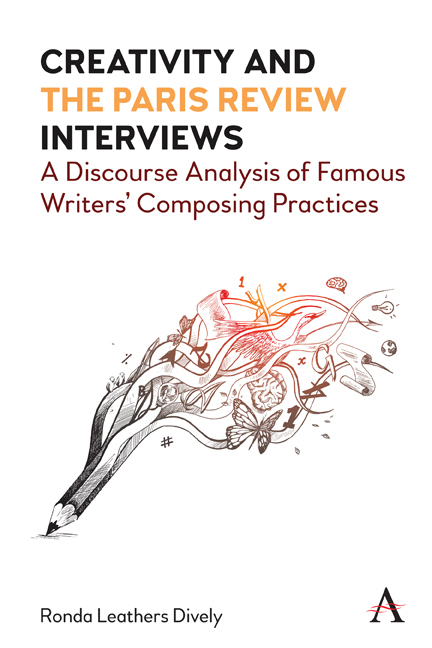 Creativity and 'the Paris Review' Interviews
Creativity and 'the Paris Review' Interviews Book contents
- Frontmatter
- Contents
- List of Illustrations
- Preface
- Acknowledgments
- 1 Impetus, Contexts and Methods
- 2 Composition through the Lens of Creativity Theory
- 3 First Insight, or the Glimmer of Possibility
- 4 Preparation, or Research Broadly Conceived
- 5 Incubation, or Breaks from Conscious Attention
- 6 Insight, or the Eureka Experience
- 7 Verification, or Evaluation
- 8 Emergent Patterns
- 9 Implications for Writing Instruction
- Appendix A Coding Table
- Appendix B List of Cited Paris Review Interviewees
- Appendix C Diagram of Analytical Categories, Subcategories and Themes
- References
- Index
8 - Emergent Patterns
Published online by Cambridge University Press: 27 April 2022
- Frontmatter
- Contents
- List of Illustrations
- Preface
- Acknowledgments
- 1 Impetus, Contexts and Methods
- 2 Composition through the Lens of Creativity Theory
- 3 First Insight, or the Glimmer of Possibility
- 4 Preparation, or Research Broadly Conceived
- 5 Incubation, or Breaks from Conscious Attention
- 6 Insight, or the Eureka Experience
- 7 Verification, or Evaluation
- 8 Emergent Patterns
- 9 Implications for Writing Instruction
- Appendix A Coding Table
- Appendix B List of Cited Paris Review Interviewees
- Appendix C Diagram of Analytical Categories, Subcategories and Themes
- References
- Index
Summary
As established in the first two chapters of this book, the paradigmatic creative process model is a long-standing template for understanding and categorizing activities involved in a variety of creative endeavors. Of course, most (if not all) models are flawed to some degree as their inherent economy prevents them from fully accounting for the phenomena they represent. In keeping with that observation, the model applied in analyzing data for this study does not, by itself, automatically call to mind the rich array of contextual factors that may influence creativity. While Chapters 3 through 7 of this study do regularly entertain contextual factors that affect the model's elements as illustrated in the sampled Paris Review (PR) interviews, the model does not readily subsume all salient themes that emerge through close reading of the data. To that point, the outlying patterns addressed in this chapter have less to do with particular composing subprocesses and their immediate stimuli and more to do with acts of composing on the whole. In metaphorical terms, while Chapters 3 through 7 zoom in on specific writing practices and matters that directly influence them, Chapter 8 adopts a wide-angle lens, revealing how a number of environmental, economic and sociocultural circumstances can impact the larger experience of becoming and living as a professional writer.
Data addressed in this chapter, a total of 651 passages, ultimately disperse across six subcategories: reasons for writing; role of art, including writing; difficulty of writing; confidence, or lack thereof; conditions for writing; and attitudes toward creative writing courses. Further, the data relevant to each of these subcategories fall into themes that lend those subcategories an illuminating level of detail. The themes attributed to conditions for writing are especially significant in terms of the number of data points that cluster around each of them (which might have justified them as subcategories in their own right). While readers may take issue with the assignment of some of the data presented in this chapter, it bears emphasizing, as mentioned in previous chapters, that qualitative research is not and does not purport to be an exact science.
- Type
- Chapter
- Information
- Creativity and 'the Paris Review' InterviewsA Discourse Analysis of Famous Writers' Composing Practices, pp. 123 - 148Publisher: Anthem PressPrint publication year: 2022


